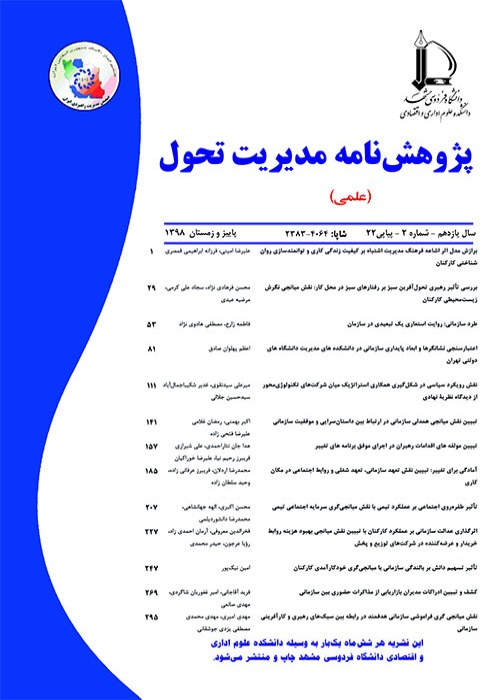Job Performance at Universities: The Role of Job Satisfaction, Work Orientation, and Organizational Commitment
Author(s):
Article Type:
Research/Original Article (دارای رتبه معتبر)
Abstract:
Introduction
In the modern age, many organizations focus on human resources management so as to meet the need of their staff in order to encourage them to increase their quality of work along with more exploitation of human resources. To this end, discovering and understanding the behavior of the staff at workplace and optimizing them with respect to the purposes of the organization are of substantial importance. In this regard, many studies have been conducted on how organizations could increase their profitability and competitiveness in their markets through human resources. In this study, it is attempted to examine the role of job satisfaction, work orientation, and organizational commitment on job performance at universities while considering their systematic interrelations.
Theoretical Foundations:
Organizational commitment is known as one of the most important organizational concepts which has been investigated extensively due to its prominent significance in the performance and functionality of organizations. By conducting a deep study of organizational commitment, Allen and Meer (1997) state that organizational commitment is an important outlook in occupations and organizations; in other words, it is one of the most significant notions in the areas of management, organizational behavior, and human resources management.
Method
The sample population of the study includes the staff of a higher education institute in Mashhad, Iran. Given the limited number of the sample population, i.e. 96 individuals, the census sampling method was used. The tool used for data collection in this study is a questionnaire containing 28 items. In this regard, questionnaires were distributed among the entire members of the population and 92 completed questionnaires were ultimately collected. To evaluate the internal consistency, the reliability assessment was carried out using Cronbach’s Alpha; the alpha coefficient for all variables were reported as more than 0.7. Hypotheses of the Study Hypothesis 1: Organizational commitment has a positive, significant effect on job satisfaction. Organizational commitment is a degree through which the staff determine their identities (Fu & Deshpande, 2013). Consequently, organizational commitment is a criterion for measuring the extent of willingness to remain in an organization in the future. Hypothesis 2: Organizational commitment has a positive, significant effect on job performance. Job satisfaction is a combination of psychological, physical, and environmental conditions which may lead to one’s satisfaction over their job. Furthermore, job satisfaction is a positive, favorable emotional state which is the consequence of job assessment or the individual’s experience. Hypothesis 3: Job satisfaction has a positive, significant effect on job performance. The behavior of the personnel at their jobs depends on the result of a succinct assessment on the conditions of their workplace. Orientations can be positive, negative, or neutral; it could also be different in terms of intensity. Ultimately, it could lead to more or less resistance against changes. Hypothesis 4: Work orientation has a positive, significant effect on job performance.
In their study, 1. Ahmad, H., Ahmad, K., & Shah, A. I. (2010). Showed that work orientation involves a positive, significant impact on the staff’s job performance. Hypothesis 5: Work orientation has a positive, significant impact on job satisfaction. Job satisfaction is influenced by orientations toward work.
Results
According to the findings of the study, the first hypothesis stating the positive, significant effect of organizational commitment on job satisfaction was confirmed, given the t value of 2.151. The results obtained from testing the hypotheses show that organizational commitment has a positive, significant effect on job performance (t value of 2.869), confirming the second hypothesis. The results also showed that the positive, significant impact of job satisfaction on job performance was confirmed through a t value of 2.456. Work orientation also has a positive, significant effect on job performance (a t value of 2.116, more than 1.96), confirming the fourth hypothesis. Finally, the fifth hypothesis regarding the positive, significant effect of work orientation on job satisfaction was not confirmed given an obtained t value of 0.384; subsequently, the fifth hypothesis is rejected.
Discussion and Conclusion:
To achieve their purposes, successful organizations rely on the high performance of their staff. Consequently, in order to achieve strategic purposes and conserving the competiveness advantage, the staff of these organizations ought to perform at a high level (Shamailan, 2016). As a result, it was attempted in the present study to examine the most important organizational factor affecting job performance such as job satisfaction, work orientation, and organizational commitment. The results showed that organizational commitment has a positive, significant effect on job performance. This means that staff with higher organizational commitment would have a better job performance. According to the results of this study, a higher level of job performance could be achieved in organizations by increasing the level of job satisfaction, which, in turn, would increase work efficiency. Furthermore, work orientation also has a positive effect on job satisfaction, though it is not as significant. This hypothesis was, perhaps, rejected as a result of the fact that work orientation expresses emotions that individuals show, regarding various aspects of their workplace; subsequently, the absence of a significant relation between work orientation and job satisfaction is due to the inconsiderable willingness of staff towards their jobs. Ultimately, as such individuals show little interest in their jobs, achieving job satisfaction for them would be difficult through this way.Language:
Persian
Published:
Transformation Managemet Journal, Volume:9 Issue: 2, 2018
Pages:
142 to 159
magiran.com/p1907226
دانلود و مطالعه متن این مقاله با یکی از روشهای زیر امکان پذیر است:
اشتراک شخصی
با عضویت و پرداخت آنلاین حق اشتراک یکساله به مبلغ 1,390,000ريال میتوانید 70 عنوان مطلب دانلود کنید!
اشتراک سازمانی
به کتابخانه دانشگاه یا محل کار خود پیشنهاد کنید تا اشتراک سازمانی این پایگاه را برای دسترسی نامحدود همه کاربران به متن مطالب تهیه نمایند!
توجه!
- حق عضویت دریافتی صرف حمایت از نشریات عضو و نگهداری، تکمیل و توسعه مگیران میشود.
- پرداخت حق اشتراک و دانلود مقالات اجازه بازنشر آن در سایر رسانههای چاپی و دیجیتال را به کاربر نمیدهد.
In order to view content subscription is required
Personal subscription
Subscribe magiran.com for 70 € euros via PayPal and download 70 articles during a year.
Organization subscription
Please contact us to subscribe your university or library for unlimited access!



